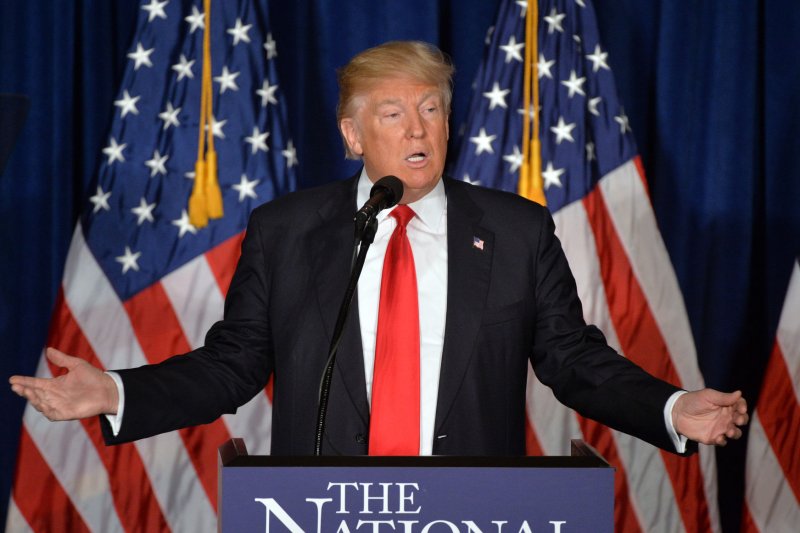Donald Trump gives a formal address on foreign policy at the Mayflower Hotel in Washington, D.C., on April 27. The speech comes the day after Trump won landslide victories in five northeastern states and declared himself the presumptive Republican nominee. Photo by Kevin Dietsch/UPI |
License Photo
WASHINGTON, April 27 (UPI) -- Republican presidential front-runner Donald Trump delivered what his campaign billed as a major foreign policy address Wednesday, calling for an overhaul of America's relationships with nations around the world and promising as president a "coherent foreign policy based on American interests."
Trump -- who gave the speech the day after sweeping five northeastern states, bringing the GOP nomination within reach -- called for two summits with allies in Europe and Asia, to renegotiate alliances he said are too costly for the United States to maintain, and to develop "new strategies for meeting our common interests."
Trump assailed U.S. foreign policy under President Barack Obama as "reckless, rudderless and aimless." He repeatedly tied Democratic front-runner Hillary Clinton to Obama's foreign policy for her time serving as his secretary of state and assailed her handling of the attack on a diplomatic compound in Benghazi, Libya, that left the U.S. ambassador and three others dead.
"Instead of taking charge that night, Clinton decided to go home and sleep. Our ambassador was murdered and the secretary was asleep," Trump said.
At the outset of his speech, Trump promised the animating principle for all of his foreign policy decisions, from the use of military force to negotiating trade deals and immigration, would be to "put the interests of the American people first."
Trump spoke to the Center for the National Interest, a public policy think tank, inside a ballroom at the Mayflower Hotel in Washington, D.C. In what was a significant departure from his off-the-cuff, often rowdy campaign speeches, Trump used a teleprompter and spoke mostly from what appeared to be prepared remarks. The audience, far from the raucous crowds that have filled arenas in primary states, was in business attire, interrupting the candidate occasionally with polite applause.
Trump has faced considerable criticism over foreign policy, especially after calls to abandon the U.S. role in the North Atlantic Treaty Organization, or NATO, and for remarks suggesting Japan and South Korea should develop their own nuclear arsenals rather than rely on the U.S. nuclear umbrella for protection against a nuclear-armed North Korea.
Obama, who has largely refrained from commenting on the election, slammed Trump, saying, "the person who made the statements doesn't know much about foreign policy, or nuclear policy, or the Korean peninsula -- or the world generally."
Trump misspoke once during the speech. When referencing terrorist attacks against the United States in Africa in the 1990s, he mispronounced the African nation Tanzania. (He called the country tan-ZAYN-ee-uh, rather than its proper pronunciation tan-zuh-NEE-uh.)
White House spokesman Josh Earnest mocked Trump's mistake. He told reporters during his daily press briefing he had not watched Trump's speech. When a reporter told Earnest about the Tanzania flub, he joked: "Apparently the phonetics aren't included on the teleprompter."
Earnest also pushed back against one of the criticisms Trump included in his speech, that foreign leaders do not respect Obama, as evidence by their reluctance to greet him when Air Force One touches down.
Earnest said it is common practice for the president to be greeted by lower-level officials upon landing in a country so Obama can meet with the host-nation's head of state for the first time in a more formal setting later in the trip.
Trump also demonstrated his willingness to break with Republican orthodoxy, touting his opposition to the war in Iraq, promising he would not use the military as a first option in advancing American interests. He called for an end to "nation-building" in the Middle East, saying U.S. interventions have given rise to the Islamic State.
"We thought we could make Western democracies out of countries that had no interest or experience in becoming Western democracies," Trump said.
He also criticized the Obama administration's deal aimed at preventing Iran from developing a nuclear weapon, saying Iran had started ignoring the agreement "before the ink was dry."
"Iran cannot be allowed to have a nuclear weapon, remember that, cannot be allowed to have a nuclear weapon. And under a Trump administration [they] will never be allowed to have that nuclear weapon," Trump said. "In negotiation, you must be willing to walk. The Iran deal is a result of [the U.S.] not being willing to leave the table."















